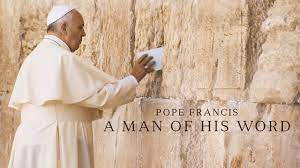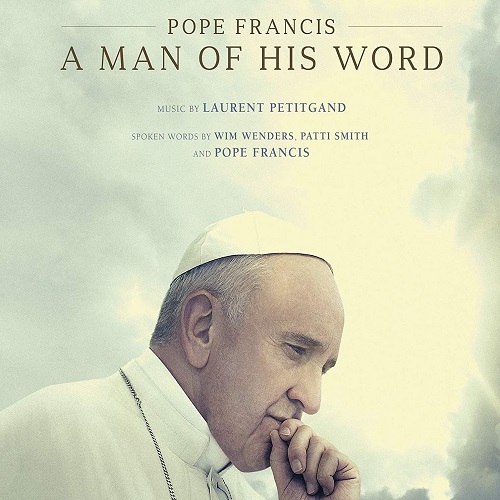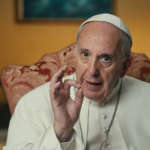Pope Francis: A Man of His Words (A film by Wim Wenders)
Overview
The film discusses a formula of living in today’s world that the Pope Francis has given – be in peace with each other and in harmony with the environment. We can draw a parallel between the philosophy espoused by the Pope Francis and St Francis of Assisi. Perhaps the Pope chose the name Francis as he was already following the philosophy of St Francis of Assisi.
Saint Francis of Assisi lived 800 years ago in a small town in Italy, he heard the voice of God – “Francis go and restore my house it’s falling into ruins.” He abandoned a life of luxury for a life devoted to Christianity. He is also known as the patron saint of animals and the environment.
Pope Francis also decided to live his life in poverty, according to him it is needed today. He renounced the luxurious lifestyle that is offered to the Pope and chose to live in a small two-room guest unit in the Vatican, saying, “because I see poverty all around, children without food and education, etc.” Exactly the same words that Gandhi spoke when he exchanged his three-piece suit for a loincloth around his waist.
Pope Francis gives a formula to humanity – talk little, listen a lot and just say enough, and always look people in the eye, don’t look up to anyone and don’t look down on anyone.
The film understands the Church as a human body, subject to disease and defilement, and needing some treatment. Perhaps referring to the crisis of faith and attendance that Christian churches are facing all around the world, more so in the Western world.
He talks about people collecting wealth in order to feel secure, and that applied to the church as well. In his inauguration speech Pope Francis said, “as long as the church is placing its hope in wealth Jesus is not there, it would be more like an NGO for charity or culture but it is not the church of Jesus, poverty is at the centre of Gospel.” He wants a poor church for the poor.
He referred to thinking about “the poorest of the poorest of the poor,” resonating with what Gandhi said more than eight decades ago – in deciding what is the right action. Gandhi said – if you want to know what is a noble decision – think of the poorest man on this earth and ask yourself – in what way my actions are going to make a difference to their lives.
Further on Pope Francis has expressed concern about how we have plundered the mother earth, and the culture of waste and consumerism, the economy of exclusion and inequality, and environmental disaster. He says, “we see ourselves as the masters of the earth – not its caretakers, and that has been tragic.
His advice – the business and frenzy of modern lifestyle stops us from listening well to what others are saying. Someone is halfway through dialogue and we are ready to interrupt and want to answer before the other person has finished talking.
We live with accelerator down all the time – it ruins physical, mental and spiritual health and destroys families and therefore society. When we live a fast-paced life we lose our most human gestures – no time to enjoy life.
He also talks about the importance of Sabath – every Saturday – at least one day a week you suspend your routine – and devote your time to the family, god, in gratitude and meditation – we are not machines.
Buddhism says the same thing – the doctrine is to meditate one hour twice daily, and one full day every fortnight. It’s the time one spends in solitude, in communication with one’s own soul/divine self.
The film describes his philosophy further as –
– His question – Do you play with your children? – Regarding gays he said, “we must be brothers to each other – who am I to judge – No one should be marginalised.” – He is critical of feminist movements that only talk about women- he recommended the integration of both genders in one’s approach. – We should be reconciled with our own death. – To love – demands freedom, if there is no freedom you can’t call it love, to love or not to love – that freedom is necessary to be able to love. – Not be scared of the foreigners and refugees – do unto them what you want done to yourself, give them security, opportunity, life, etc. – Questioning the morality of selling deadly weapons to nations that inflict suffering on others. – We can all get by with less – he chooses to travel in a small car during his US trip. St Francis of Assisi – also cared about nature and sister mother earth St Francis of Assisi – traveled to war-torn areas to bring peace between Christians and Muslims. Approached the Christian commanders and also the sultan of Egypt. “Never take a proselytising attitude” he would say this both to Christians and muslins when he went to the mosques in Jordan and Egypt.
St. Francis said: ‘My dear son, be patient, because the weaknesses of the body are given to us in this world by God for the salvation of the soul. So they are of great merit when they are borne patiently.” Along the same lines, when Yogananda asked Ramana Maharishi, “why God allows so much suffering in this world, why can’t He wipe it out.”
To which Raman Maharishi said, “because it’s the suffering that motivates people to move away from worldly enjoyment/ distractions to seek true liberation and happiness. Without suffering, we humans will always remain caught up in the illusions and miss out on real happiness.

“Lord, make me an instrument of thy peace. Where there is hatred, let me sow love, Where there is injury, pardon; Where there is doubt, faith; Where there is despair, hope; Where there is darkness, light; And where there is sadness, joy. O Divine Master, grant that I may not so much seek to be consoled as to console, to be understood as to understand, to be loved, as to love. For it is in giving that we receive, It is in pardoning that we are pardoned, and it is in dying that we are born to eternal life.” ― St. Francis of Assisi Other Quotes from him “Remember that when you leave this earth, you can take with you nothing that you have received – only what you have given.”
“Above all the grace and the gifts that Christ gives to his beloved is that of overcoming self.”
“No one is to be called an enemy, all are your benefactors, and no one does you harm. You have no enemy except yourselves.”
“We have been called to heal wounds, to unite what has fallen apart, and to bring home those who have lost their way.”
Francis of Assisi died young on October 3, 1226, at the age of 44, in Assisi, Italy. During his lifetime he suffered from physical ill-health manifesting in the form of chronic bodily wounds. There as different theories of the causation of those wounds – leprosy contracted from people he came in contact, stigmata of Christ, a result of the wayward lifestyle he had led before becoming a saint.
He was able to heal a lot of people of their physical wounds, but he was unable to heal the wounds on his own body. Such are the laws of Karmas that one has to bow to, in this hugely complex human life.
© Kishore Chandiramani, Consultant Psychiatrist
Emotions Clinic, Education and Training Centre Cic, Staffordshire, England
www.undoyourstress.com




